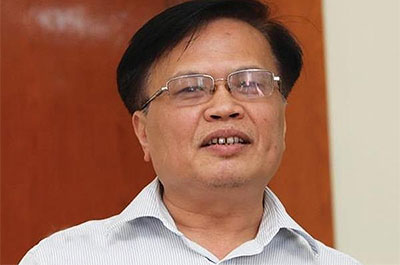Improving the state’s role - the focus of reforms
 You have said that the concept of a socialist-oriented market economy has been made clearer and more concrete in the 12th Party Congress memorandum. Can you explain?
You have said that the concept of a socialist-oriented market economy has been made clearer and more concrete in the 12th Party Congress memorandum. Can you explain?
This concept has become clearer, that is to say that the economy will fully and synchronously operate under market rules. With this orientation, we can expect the institutional reforms of the future to be more market-oriented.
Specifically, in respect to the new-generation free trade agreements (FTAs) I would like to say that the media often mentions that these FTAs will usher in new growth opportunities for the country. These opportunities, however, are insufficient to elevate Vietnam’s development to keep up with our regional peers. That is because our market economy is not yet perfect and is still largely controlled by state decisions. The FTAs, by essence, aim for more freedom with a safer environment with fewer risks for business activity.
Therefore, changes are important. This is possibly a favourable time for Vietnam to execute policies to boost the market nature of the economy.
How could we achieve that goal?
Until now, we could say that the past reforms came from the market, whereas there was little change in the state’s role. Without changes from the state, the market was unable to improve much. Therefore, in the coming time, the reforms will focus on changing the state’s role, meaning a change in the way of thinking, the state’s management methods, as well as changing the state’s management organisational structure.
This also presents an opportunity to change major bottlenecks in Vietnam’s market economy.
What are the market economy bottlenecks?
The first bottleneck relates to forms of ownership. Vietnam is yet to completely change from public ownership to private; therefore many properties do not have clear owners. This explains why we still do not have production factor markets, such as capital, labour or land markets.
The market, therefore, is yet to serve as a factor in resources distribution. The give-ask mechanism still prevails, which remains the biggest bottleneck of current market economy.
The 12th Party Congress documents discuss the development of the land market, particularly regarding agricultural land. This means big changes could take place in this field, paving the way for a change in current household-based agricultural production methods.
The farmers, if granted the right to change their agricultural land ownership rights, could embark on other business enterprises, instead of clinging to the land, albeit not using it.
Similarly, for publicly owned assets, it is crucial to establish an institutional system allowing trading rights. The core task is implementing reforms and forming production factor markets, as highlighted in the 12th Party Congress’s memo.
The second bottleneck is the lack of a competitive market. It is now easier for a business start-up, but the systems to ensure just and impartial competition are not yet in place.
Settling disputes is another bottleneck. The court has yet to provide trustworthy and effective legal services that people can put trust in to protect their assets when disputes arise.
Does this mean that will there be big institutional changes right in 2016?
The 12th Party Congress has adopted this Resolution with stronger development orientations compared to the previous Resolution. Taking action, however, depends on the leaders.
In my view we cannot wait for change to arrive. Instead, the business community and associated individuals must have a consensus in demanding for change.
For instance, there is no room for the creation of backward regulations creating barriers to doing business.
| RELATED CONTENTS: | |
| Improving the state’s role - the focus of reforms | |
| New leaders pledge sustainable future | |
| MPI chief makes rallying call for reform | |
What the stars mean:
★ Poor ★ ★ Promising ★★★ Good ★★★★ Very good ★★★★★ Exceptional
Latest News
More News
- NAB Innovation Centre underscores Vietnam’s appeal for tech investment (January 30, 2026 | 11:16)
- Vietnam moves towards market-based fuel management with E10 rollout (January 30, 2026 | 11:10)
- Vietnam startup funding enters a period of capital reset (January 30, 2026 | 11:06)
- Vietnam strengthens public debt management with World Bank and IMF (January 30, 2026 | 11:00)
- PM inspects APEC 2027 project progress in An Giang province (January 29, 2026 | 09:00)
- Vietnam among the world’s top 15 trading nations (January 28, 2026 | 17:12)
- Vietnam accelerates preparations for arbitration centre linked to new financial hub (January 28, 2026 | 17:09)
- Vietnam's IPO market on recovery trajectory (January 28, 2026 | 17:04)
- Digital economy takes centre stage in Vietnam’s new growth model (January 28, 2026 | 11:43)
- EU Council president to visit Vietnam amid partnership upgrade (January 28, 2026 | 11:00)
















 Mobile Version
Mobile Version